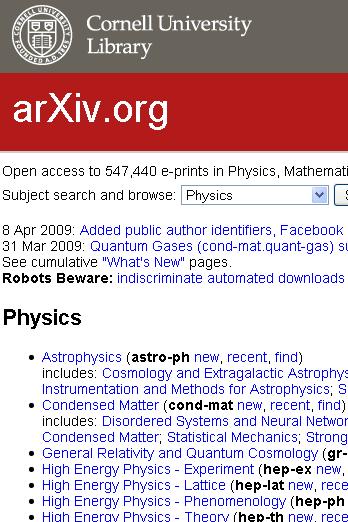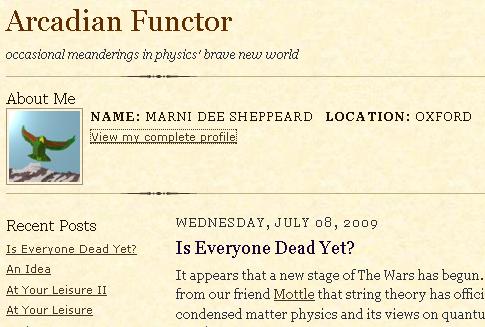 The Arxiv is an online repository of scientific papers in physics, astronomy, maths, cosmology, computer science, and a few other topics, where papers due to be published on scientific journals are submitted by the authors, and become quickly accessible for free to anybody before the peer-review process ran by the journals is over and they get printed there.
The Arxiv is an online repository of scientific papers in physics, astronomy, maths, cosmology, computer science, and a few other topics, where papers due to be published on scientific journals are submitted by the authors, and become quickly accessible for free to anybody before the peer-review process ran by the journals is over and they get printed there. While the Arxiv is totally access-free, not everything can be published there: the existence of people with funny ideas on what a scientific paper is or what it should or should not contain makes some pre-filtering on the archived material a good idea, although potentially a filtering is a dangerous thing in wrong hands.
Marni Dee Sheppeard is a theoretical physicist, currently doing research on Category Theory at Oxford University; she also owns a beautiful blog (see below) where you can find over 200 easy lessons on the topic of her studies. She is a friend of mine.
 Now, Marni has had some trouble getting her papers through the filters of the Arxiv. It appears that the Arxiv is censoring a few scientists, or at least making it harder for them to submit papers there. Among them apparently is Marni, as well as Carl Brannen, a brilliant guy who does independent research on theoretical physics. Other examples (such as Tony Smith) have been denounced in the past. The impression is that the filter acts on names, and not just on content. This would be really disturbing, and I would love to find out whether it is the case.
Now, Marni has had some trouble getting her papers through the filters of the Arxiv. It appears that the Arxiv is censoring a few scientists, or at least making it harder for them to submit papers there. Among them apparently is Marni, as well as Carl Brannen, a brilliant guy who does independent research on theoretical physics. Other examples (such as Tony Smith) have been denounced in the past. The impression is that the filter acts on names, and not just on content. This would be really disturbing, and I would love to find out whether it is the case.Last week I visited Marni in Oxford and we chatted about the issue. I suggested an experiment: finding a respectable physicist with a history of several successful subscriptions, and getting him or her to submit a paper entirely written by Marni or Carl, whose content closely matches that of one of the previously banned papers they submitted with no success.
The idea is to test whether the article goes through without effort -which proves that the Arxiv is effectively blacklisting some individuals for no good reason- or whether it gets blocked regardless of the name on top of it. In this latter case, we would then have to discuss what in the paper is not worth publication according to the Arxiv admins, but we would have one less thing about which to complain. I think this is valuable information for many scientists, so I would really like to see this experiment carried out.
So, if in the past you have submitted at least a few papers in hep-th or hep-ph -the archives of theoretical physics and phenomenology, respectively-, you qualify for the experiment. Please write privately that you are available to Marni (her email address is in the comments thread of her post on the matter): even walls have ears, and the internet does not even have walls.




Comments